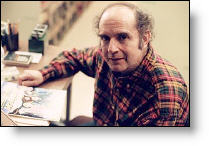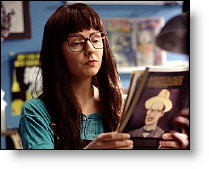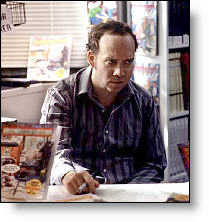American Splendor
 for language.
for language.
| Moral Rating: | not reviewed |
| Moviemaking Quality: |
|
| Primary Audience: | Adults |
| Genre: | Drama and Animation |
| Length: | 1 hr. 40 min. |
| Year of Release: | 2003 |
| USA Release: |



| Featuring |
|---|
| Paul Giamatti, Hope Davis, James Urbaniak, Harvey Pekar, Judah Friedlander |
| Director |
|
Shari Springer Berman Bob Pulcini |
| Producer |
| Ted Hope |
| Distributor |
Here’s what the distributor says about their film: Harvey Pekar is file clerk at the local VA hospital. His interactions with his co-workers offer some relief from the monotony, and their discussions encompass everything from music to the decline of American culture to new flavors of jellybeans and life itself. At home, Harvey fills his days with reading, writing and listening to jazz. His apartment is filled with thousands of books and LPs, and he regularly scours Cleveland’s thrift stores and garage sales for more, savoring the rare joy of a 25-cent find. It is at one of these junk sales that Harvey meets Robert Crumb, a greeting card artist and music enthusiast.
When, years later, Crumb finds international success for his underground comics, the idea that comic books can be a valid art form for adults inspires Harvey to write his own brand of comic book. An admirer of naturalist writers like Theodore Dreiser, Harvey makes his ‘American Splendor’ a truthful, unsentimental record of his working-class life, a warts-and-all self portrait. First published in 1976, the comic earns Harvey cult fame throughout the 1980s and eventually leads him to the sardonic Joyce Barber, a partner in a Delaware comic book store who end ups being Harvey’s true soul mate as they experience the bizarre byproducts of Harvey’s cult celebrity stature.




It is often grubby and grey, but so is life. This is more real than disgusting, mindless trash like “Fear Factor” or “Survivor”, where people do outrageous things to attain money and fleeting fame, because it shows Harvey and his family going about their everyday lives. Much could be learned by the kind of love shared by Harvey and Joyce in this movie; it’s common, without lots of hearts and flowers and fancy words and long, loving stares into each other’s eyes. Die-hard romantics can scoff all they want; it’s this kind of common, real-world love that pulls them through the horrors of Harvey’s cancer treatment. I assume that the words “Do you _____ take ______ here present to be your lawfully wedded (husband/wife), in sickness and in health, for better or for worse, in good times and in bad, untill death do you part?” were included in Harvey and Joyce’s wedding vows. If so, then they have certainly held to them.
My Ratings: [Good/5]